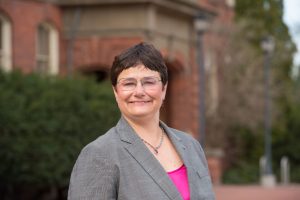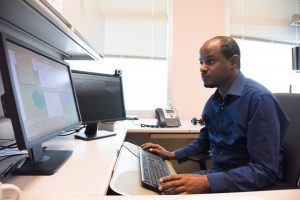August 9, 2023 WSU Tri-Cities’ Institute for Northwest Energy Futures appoints inaugural director and assistant director
By Lacey Desserault
Noel Schulz has been appointed the inaugural director and Yonas Demissie the assistant director of WSU Tri-Cities’ Institute for Northwest Energy Futures (INEF). Schulz’s wealth of experience and expertise in the fields of engineering and energy and Demissie’s background in water, climate change, and energy will be assets for INEF as the institute helps to further establish the Tri-Cities as a sustainable energy hub for the state of Washington and the nation.
Schulz is the Edmund O. Schweitzer III Chair in Power Apparatus and Systems in the WSU Voiland College of Engineering and Architecture. Her experience includes teaching courses in renewable and distributed energy generation, energy conversion, and smart grid technologies. Her published research focuses on power systems modeling and analysis, smart grid applications, microgrids, renewable energy, and shipboard power systems, and her work has been funded by several agencies, including the US Departments of Energy, Defense, and Homeland Security.

Noel Schulz
“I am honored to be the INEF inaugural director and work with WSU Tri-Cities’ Chancellor Haynes. INEF provides an excellent opportunity for WSU to leverage system expertise including all campuses and extension to advance clean energy solutions across the region, state and beyond,” said Schulz. “I look forward to relocating to the Tri-Cities area and working more closely with WSU Tri-Cities and local leaders on energy-related topics.”
Demissie is an associate professor of civil and environmental engineering at WSU Tri-Cities. His research interests include systems analysis and optimization of water-energy-climate nexus to improve sustainability and resilience of the energy system. Before he joined WSU, he was at Argonne National Laboratory studying the relationship between water resources and biofuel and other renewable energy sources. He also led various research projects and published several articles related to the potential impacts of climate change on water, infrastructure resilience to climate change and uncertainty, and impacts of droughts on electric production and distribution.

Yonas Demissie
“I am honored to lead the clean energy center along with Dr. Schulz and work with faculties, students, and community and industry partners to accelerate clean energy and climate solution innovation in Washington and expand the state’s clean energy workforce,” Demissie said. “The center can serve as a central hub for coordinating, facilitating, and accelerating the ongoing efforts towards building a cleaner, more sustainable energy future in Washington.”
Centered at the WSU Tri-Cities campus, INEF utilizes scientific expertise to guide the transition into maintaining safe, economic, and reliable energy systems. These systems aim to reduce greenhouse gas emissions and have more equitable social outcomes through a systems approach, as the demand for more resilient, affordable, and available low-carbon electricity and transportation fuels increases. The INEF initiative will integrate new and existing scientific capacity in engineering, the environment, economics, business, and society to produce objective research and analysis. The goal is to act as a conduit between science and policy for the clean energy transition and communicate it effectively to consumers.
“The Institute for Northwest Energy Futures will bridge the gap between science and policy for innovations in clean energy by leveraging WSU research expertise in power, transportation, fuels, and other areas in a systems analysis approach. Located on the Washington State University Tri-Cities campus, WSU and research partners such as the Pacific Northwest National Laboratory are well-positioned to leverage scientific expertise to translate advancements in research into development of resilient clean energy transitions aimed to lower greenhouse gas emissions and address equity issues in energy policy and production,” said Christopher Keane, vice president for research at WSU and vice chancellor for research at WSU Pullman. “As a nationally recognized expert in power systems engineering, Noel brings a wealth of scientific knowledge that will help to establish connections and collaborations needed to integrate WSU’s relevant scientific capacity with the Institute, communities, industry, and policymakers.”
Earlier this year, the state approved $7.7 million for the 2023-25 biennium to hire researchers and staff and secure a new facility to house the institute. The institute will hire eight scientists and engineers – five, including the director, will be located at WSU Tri-Cities, and three will be at WSU Pullman. The WSU Tri-Cities scientists will bring experience in energy data analytics, social impacts, life cycle assessment, and techno-economic analysis.
“Dr. Schulz and Dr. Demissie bring a depth and breadth of experience to this position that will be necessary to move the institute forward,” said Sandra Haynes, chancellor of WSU Tri-Cities. “Dr. Schulz’s work with the PNNL/WSU Advanced Grid Institute is of particular relevance and will serve her in building out INEF. She is a proven leader, educator, researcher, and collaborator ready to bring INEF to its full potential.”
For more information about INEF and WSU Tri-Cities, visit tricities.wsu.edu/inef




